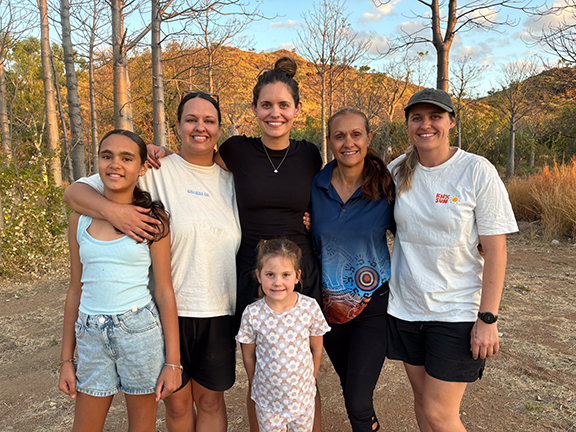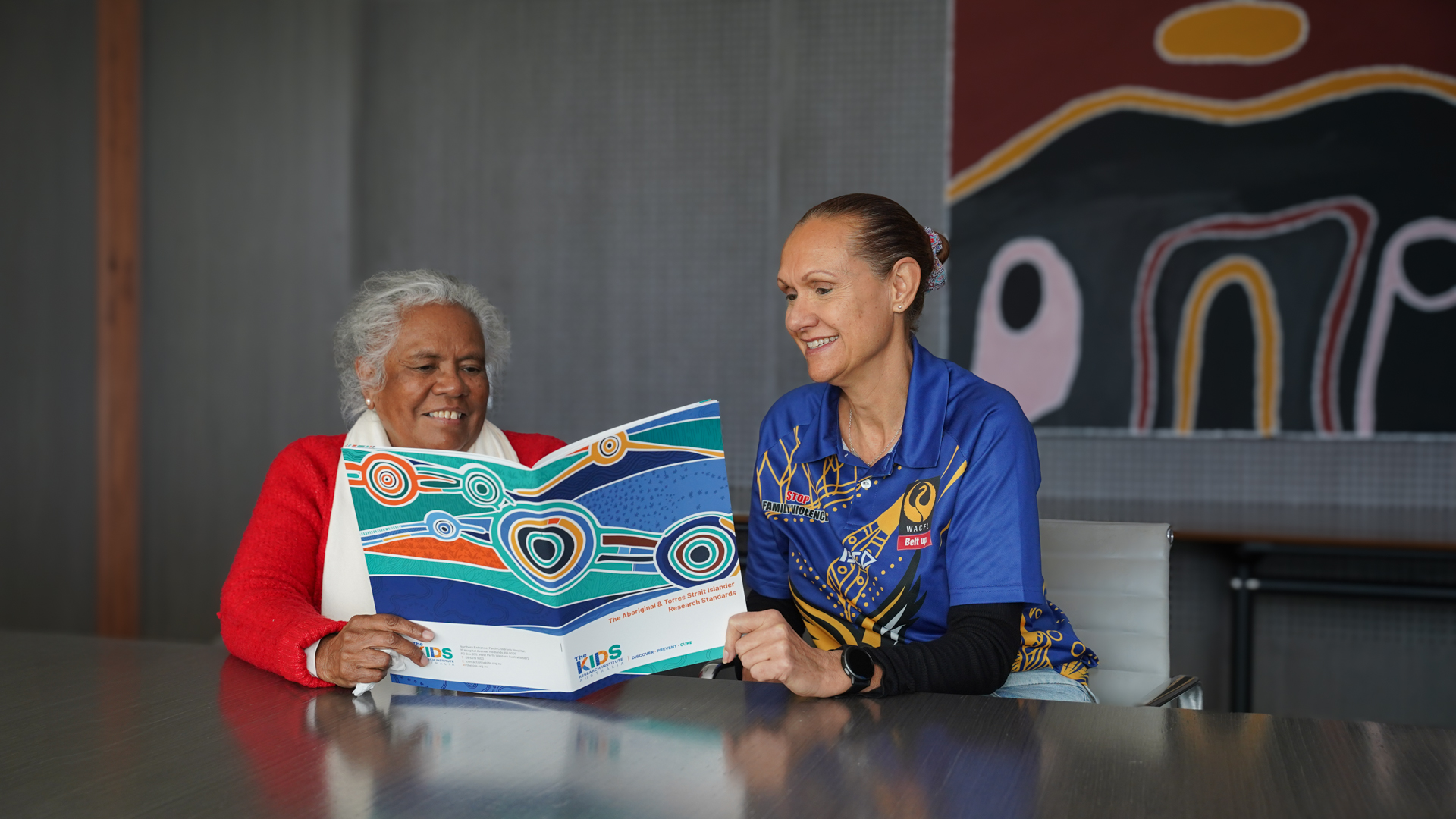National Aboriginal and Torres Strait Islander Children’s Day is a day all Australians are urged to celebrate Aboriginal and Torres Strait Islander children and learn about the impact that culture, family and community plays in the life of every child.
For Head of the Kulunga Aboriginal Unit at The Kids Research Institute Australia, Cheryl Bridge, this National Day of Recognition, held every 4 August, is a critical opportunity to highlight the disparity that continues to exist between Aboriginal and Torres Strait Islander children compared to other Australian kids, and to focus on what policy makers and influencers are doing to close this gap.
In her role at The Kids, it is Cheryl’s mission to ensure critical Aboriginal-led research continues to translate into positive impacts for Aboriginal and Torres Strait Islander children and families.
A proud member of the Gija people through both her father and grandmother, Cheryl was born and raised in the East Kimberly region of Western Australia. Now, as a mum of three (one of whom interned at NHMRC) and a grandmother to four, Cheryl’s investment in the next generation of Aboriginal and Torres Strait Islander children is stronger than ever.
Prior to working at The Kids, Cheryl had a long career in the public sector, having spent 25 years working within the Western Australian vocational education and training sector, advancing from a level one, to a director during this time.

After two and a half decades in the sector, Cheryl felt the need for change and sought a career shift that would prioritise making a meaningful impact. Her main goal was to ensure that her work would benefit Aboriginal communities, children and families.
She joined The Kids in 2020 and leads her team in providing support, cultural awareness and an understanding of research involving Aboriginal communities across the state.
Kulunga or (Koorlangka) is a Noongar word meaning ‘children,’ and the name of the primary professional services unit at The Kids that supports researchers conducting Aboriginal health research. Kulunga connects Aboriginal communities and organisations with key research that works towards closing the gap in life expectancy for Aboriginal children and families as compared to non-Aboriginal children and families.
‘With the work that I do, I want our children to understand what is best for them and for them to realise there’s a big world out there – one where they can make their mark and make a difference as Aboriginal and Torres Strait Islander people. At the Institute itself, all the work that we do is set up to benefit families and children.’ Cheryl Bridge
When she first arrived at The Kids, Cheryl earnestly reflected on her experience with imposter syndrome, questioning how she could work with all the (in her words) amazing and smart people at the Institute.
‘It was when I realised that our communities needed a voice, and our communities needed people like me that brought that lived experience and wisdom around community and culture into research. It made me realise that I did deserve a seat around the table at a research institute.’ Cheryl Bridge
Reflecting on this notion, Cheryl knew she wanted to make a mark, and to show that Aboriginal people with strong leadership skills and drive for making impact added a completely unique value set to the Institute and the work it produces.
‘I hope this is the legacy that I leave behind in the field of Aboriginal research. That by bringing your authentic self, hard work ethic and passion for Aboriginal research makes as great of an impact as a qualification or a PhD – I am an example of this.’ Cheryl Bridge
Drawing on bringing Aboriginal leadership and governance to research, Cheryl wanted to flip the script on the narrative so that it focused less on deficits, and more on strengthening the voice of Aboriginal communities.
‘Truthfully, if we can have really strong Aboriginal governance and leadership and have our community voices heard, it will lead to benefits and impact for our communities among pressing issues such as chronic disease, youth mental health and suicide just to name a few.’ Cheryl Bridge
Through the strong Aboriginal governance and leadership fostered by Cheryl and her team at The Kids, the role of Indigenous knowledge continues to evolve within contemporary research. Cheryl notes that greater shifts can happen by listening to communities and focusing on cultural methodologies as opposed to being governed by grants, funding and western constructs.

One example of this shift and the direction in where Aboriginal and Torres Strait Islander research is headed is the release of version 2 of The Aboriginal & Torres Strait Islander Research Standards published by The Kids. The launch and implementation of this publication is something that Cheryl is most proud of, among her many other achievements during her time at the Institute thus far.
‘This publication is not just about the standards. It includes best practice training and workflow processes developed to empower our Researchers and Communities. It brings a cultural lens to research, with an emphasis on Aboriginal ways of knowing, being and doing.’ Cheryl Bridge
Cheryl regards The Kids’ commitment to improving the health and wellbeing of Aboriginal and Torres Strait Islander communities and families as one of the reasons she enjoys getting up and going to work each day. Additionally, the Institute’s Indigenous employment rate of about 7%, with over 80 Aboriginal and Torres Strait Islander staff, Elder co researchers and students is a source of pride. However, she acknowledges that there is still much work to be done.
‘It's not lost on me that for 25 years I was one of the only Aboriginal people that sat around the table. Now I'm one of many and we all have the same goal.’ Cheryl Bridge
Beyond her work at The Kids, Cheryl is also a member of the recently established NHMRC-MRFF Indigenous Advisory Group (2024–2027) and NHMRC-MRFF Consumer Advisory Group (2024–2027). Receiving these appointments brought back the feeling of imposter syndrome and Cheryl is still learning the ropes and expectations of the committees. Taking it in her stride once again, Cheryl hopes that these appointments build on her knowledge to understand the health and medical research space better.
‘Sometimes you work in your bubble and for me personally, being a part of these committees has allowed me to see a wider perspective in areas that I may not have been exposed to in the past.’ Cheryl Bridge
Looking forward to her work on these committees, Cheryl notes it’s important that the focus is on building the next generation of Aboriginal and Torres Strait Islander researchers and creating more opportunities for them to carve out their career pathways – not unlike Cheryl has so effectively done throughout her own career.
‘Capacity building is a priority across the sector and a lot is happening within the Institute. We are currently rolling out a student program for Aboriginal and Torres Strait Islander students with a lot of opportunities for them to gain scholarships and to most importantly, feel supported and connected to build their toolkits.’ Cheryl Bridge
Cheryl is an advocate for students to find their passion and the drive that will get them out of bed each morning. Her advice for the next generation of researchers stems from this, encouraging her students to do things they are passionate about and maintain strong levels of integrity and authenticity while doing so.
Whatever this looks like for the future of Aboriginal and Torres Strait Islander research, at the end of the day, Cheryl notes that we all need to stick together.
‘We need to come together, and we need to lead our space but also work with the expertise of non-Aboriginal people to get the best outcomes. Because if we think about what the end game is, and that's our families and children, we can do this. We can make a difference.’ – Cheryl Bridge.